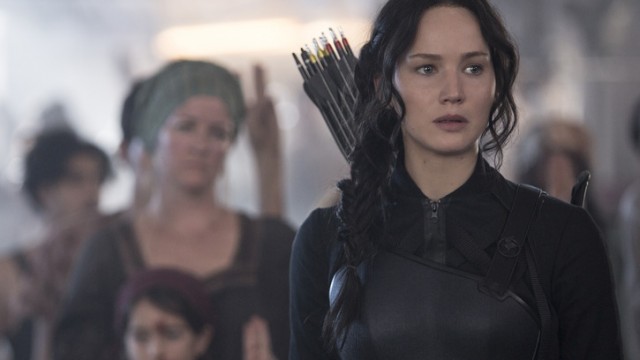Cliffhangers are a tricky business. Do it one way, and it can become an entertaining way to simultaneously push the characters forward while giving a glimpse at the future (see: The Empire Strikes Back and The Hobbit films). But others really just do it in an abrupt fashion that manages to decrease the overall quality of the film. Thankfully, The Hunger Games: Mockingjay Part One manages to avoid being a calamity. In fact, it’s an entertaining movie filled with tension packed sequences.
Things have changed immensely since this whole Hunger Games thing started. Katniss (Jennifer Lawrence) is now stuck in District 13 with a group of folks looking to take down The Capitol, and they hope Katniss can become their ultimate spokesperson. Seeing Katniss and the other characters of the franchise in this more decrepit environment does wonders for conveying in a visual sense the struggle everyone is undergoing in this time of turmoil. The stark contrast between their past and present appearances don’t get more profound than the apparent one seen in Effie Trinket, an amusing character Elizabeth Banks manages to play for some amusing fish-out-of-water gags.
I actually wish characters like her and Haymitch (Woody Harrelson) got more screentime, as they have pretty small roles, a pity considering how entertaining they are when they do pop up. Few of the other supporting characters, aside from Peeta (Josh Hutcherson), get a ton to do, since the film is content to focus on Katniss Everdeen. It’s not a bad idea, as she has some pretty compelling circumstances to deal with. The consequences of actions she intended to be very small-scale have had tremendous ripple effects, she’s become an icon so fast I’m surprised she didn’t get whiplash.
In certain scenes, I’d be lying if I wondered if maybe Lawrence could do better than this movie, since the film refuses to embrace her capabilities to handle dramatic situations in an astonishing way like she did in Silver Linings Playbook. Certain moments her feel like she’s being constrained from effectively conveying pathos, though in all fairness there are other scenes where she’s allowed to play up her dramatic potential. The story also smartly has a scene playing up Lawrence’s charming “everyday awkwardness” part of her persona when she’s trying to act in a piece of propaganda film.
Lawrence isn’t the only actor her that sometimes feels constrained; Stanley Tucci gets only three super duper brief segments, though he’s entertainingly smarmy in them, while Donald Sutherland’s turn as the franchises primary villain President Snow is given surprisingly little to do in terms of screentime or presence. Philip Seymour Hoffman and Julianne Moore at least make for an engaging duo in their scenes. Their characters, like some sequences such a take-down of two bomber jets in District 8, feel exhilarating, while other parts of this film feel like they’re just spinning their wheels, waiting for Part Two to come alone and get things started. Most of those scenes come towards the end of the film though, making the start of the picture feel more satisfying than what it precedes. In fact, I’d say everything up until Katniss fails to film a propaganda film after a District 13 bombing is pretty compelling.
Unfortunate, what follows that scene feels much less well crafted, leading to a paradox of sorts in the film, where some scenes feel top-notch, while others just feel lackluster and uncompleted. The cliffhanger ending is one such thing, it’s abruptness less making me anticipate the next movie and more making me bamboozled at it’s lack of conclusion. In its best moments, The Hunger Games: Mockingjay Part One is a triumphant, thoughtful take on an ordinary person finding themselves way in over their heads in a historic scenario. And then in it’s weaker moments, it feels like an unsatisfying cash grab. The former still stick with me, though the latter do weigh down the proceedings considerably.

